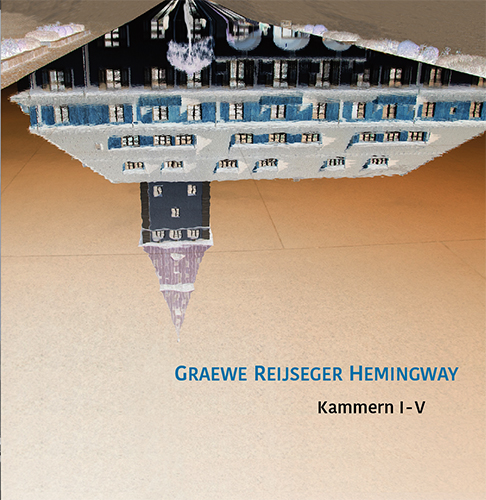
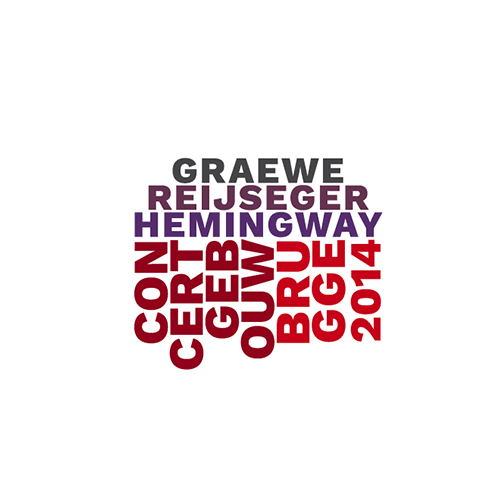
graewe
hemingway
reijseger
30th Anniversary / Jubiläum 2019 !!!
Two New Releases !!!!


Concertgebouw Brugge Release Date - November 19, 2019 || Kammern I-V 2009 Release Date - December 16, 2019
These two recordings are complete performances from five (Brugge) and ten (Elmau) years ago. The material is presented in the same order as the concert, unedited & complete. Both are exceptional performances and recordings; beautifully captured in halls with remarkable acoustics by gifted engineers. Kammern I-V, released on Auricle Records is only available in a very limited single edition of 50 cds. The packaging of each numbered CD is unique, including printed and hand painted artwork. For how to get a copy of this CD before it is gone click here.
GRAEWE/REIJSENGER/
HEMINGWAY
KAMMERN I-V Auricle Records
Die Titel deuten es bereits an: als »Kammer« betitelt und von römisch I bis V durchnummeriert – eine gewisse Strenge wirkt hier, wenngleich nicht nur. Drei Stücke von einer Viertelstunde, zwei von zehn Minuten zusammen, live vom Bayerischen Rundfunk im oberbayerischen Schloss Elmau vor einem Jahrzehnt aufgenommen. Georg Graewe am Klavier, Ernst Reijseger am Cello und Gerry Hemingway am Schlagzeug und an der Marimba, eine Combo, die bis heute auftritt. Wie gesagt: streng. Eine Strenge europäischer Moderne ab Berg bis Lachenmann ungefähr. Einer gehörigen Portion Alienation wird also Raum geboten: isolierte Akkorde, die drei Instrumente eigene Wege beschreitend … Doch das ist die halbe Wahrheit. Es gibt auch, als Gegenmittel und zur Komplettierung dieses Trioentwurfs, die immer wieder aufblitzende Lust, über die Stränge zu schlagen, dem Powerplay den Vortritt zu gestatten, so dass ein Energiebündel entsteht. Melodisch sollte man nicht viel erwarten, eher Entrückungen und Verschiebungen und Negierungen von harmonischen Substanzen, aber eine bloße Geräuschanhäufung war dieses Konzert ebenfalls nicht. Da ist schon viel Zug, kaum Leerlauf. Alle Drei diese internationalen Ensembles (Deutschland, Niederlande, USA) sind durchgängig prägnant und zumeist recht druckvoll da. Besonders Graewe faltet hier seine Fähigkeiten auf, die allumfassend zu sein scheinen. Es ist hoch eindrucksvoll, wie er etwa gegen Ende von »Kammer III« mit rasender Klarheit, durch Bässe der Linken maximal gestützt, seine Bandmitglieder mitreißt. Man fürchtet fast, ein zweifellos irrwitziger Gedanke, um die Statik des Elmauer Nobelhotels. Reijseger derweil nicht an Kontrabassfunktionen, wir haben es hier schließlich mit einem revidierten klassischen Klaviertrio zu tun, interessiert, vielmehr an grelleren, sich von Trio-Teilhabern abgrenzenden Klangfarben und auch an extended techniques. Hemingway, auf dessen Label diese Musik erscheint, dezent und kleingliedrig zumeist, vielfach offenbar mit besonders dünnen Drum Stick-Modellen hantierend, kehrt Eruption und Schlagkraft erst bei »Kammer IV« hervor: ein kompletter Drummer dann.
Applaus am Ende. APPLAUS!
JAZZ PODIUM/LEVI SORGLOS (Mai 2020)
The title already suggests it: titled »Chamber« and numbered from Roman I to V - a certain austerity works here, although not only. Three pieces of a quarter of an hour, two out of ten minutes together, recorded live by Bayerischer Rundfunk in Elmau Castle in Upper Bavaria a decade ago. Georg Graewe on piano, Ernst Reijseger on cello and Gerry Hemingway on drums and marimba, a combo that continues to this day. As I said: strict. A strict European modernity from Berg to Lachenmann. A generous portion of alienation is therefore offered space: isolated chords, the three instruments treading their own paths ... But that's half the truth. There is also, as an antidote and to complete this trio design, the ever-flashing desire to go overboard, to allow powerplay to go ahead, so that a bundle of energy is created. Melodically you shouldn't expect much, rather raptures and shifts and negations of harmonic substances, but this concert was not a mere accumulation of noise either. There is a lot of train, hardly any idle. All three of these international ensembles (Germany, Netherlands, USA) are consistently concise and usually quite powerful. Graewe in particular unfolds his skills here, which seem to be all-encompassing. It is very impressive how he pulls his band members with frenzied clarity towards the end of »Chamber III«, supported to the maximum by basses of the left. One almost fears, an undoubtedly insane thought, about the statics of the Elmau noble hotel. Reijseger, meanwhile, is not interested in double bass functions, after all we are dealing here with a revised classical piano trio, rather in brighter tones that differ from trio participants and also in extended techniques. Hemingway, on whose label this music appears, mostly subtle and subtle, often obviously handling particularly thin drum stick models, eruption and clout only emerge with »Chamber IV«: a complete drummer then.
Applause at the end. APPLAUSE!
JAZZ PODIUM/LEVI SORGLOS (May 2020)
"Das Trio von Pianist Georg Graewe – mit Ernst Reijseger (Cello) und Gerry Hemingway (Drums) – vereint auf Kammern I–V (Auricle) Individualisten der freien Improvisation im Sinne der Exaltation. Ob stille Trialoge oder wilde Exkurse durch den Kosmos des Abstrakt-Expressiven: Es ist jederzeit beeindruckend, zu welcher Kontinuität der Intensität sich hier drei Virtuosen aufschwingen. Zelebriert wird ein ungemein dichter Ausdruck. Das explosive Trio schafft Energiefelder, deren Dramatik zeigt, wie man an emotionale Grenzen geht, um wahre Unmittelbarkeit ohne Bluff zu generieren. Selten klang Musikdemokratie stringenter und deren Stimmbürger freier."
Ljubisa Tosic, Der Standard 31.12.2019
Mehr als 30 Jahre ist das trio bereits aktiv und unterwegs. eine Zeitspanne, die man in der improvisierten Musik allenfalls von for - mationen wie dem schlippenbach trio kennt. und auch wenn die intervalle größer werden, spürt man schnell die vertrautheit, die eine working Band ausmacht. im idealfall ist es Komponieren in echtzeit. Die elegant fließenden, immer wiederkehrenden Kaskaden Graewes bieten für das Kollektiv immer schon einen wunderbaren fixpunkt. sie haben etwas angenehm vertrautes, selbst dann, wenn sie von den cello-Klängen Reijsegers, mal schräg kratzend, dann wieder melodisch, durchkreuzt werden. Zwischendurch gibt er auch wieder den viersaitigen Rhythmusgitarristen. wobei Rhythmus in der Gruppe eh eine untergeordnete Rolle spielt, was sich auch immer wieder am schlag zeugspiel Hemingways festmachen lässt. er bewegt seine sticks und Besen autonom und gleichberechtigt durch Raum und Zeit, streichelt die Becken, um im nächsten Moment die standfestigkeit der Bassdrum zu testen: die auflösung der Hierarchien. wer Kammern mit aufnahmen aus der anfangszeit vergleicht, merkt, dass das impulsive ein wenig verloren gegangen ist und einer gewissen Harmonie gewichen ist, die der Musik allerdings nicht das spontane und freie nimmt. auf dem Livemit - schnitt aus dem concertgebouw Brügge aus dem Jahr 2014 wird das Ganze noch deutlicher. Die drei Musiker starten gemeinsam, biegen an unterschiedlichen Punk ten ab, um sich schließlich, wie auf Komman do, wieder zu finden. Das Kom mando nennt sich intuition. nach drei Jahr zehnten braucht man halt keine absprachen mehr – die es wohl auch vorher nie wirklich gab aber es ist hilfreich, permanent neue ideen zu haben. und so lange die nicht ausgehen, heißt es weitermachen!
Holger Pauler, freiStil 90 (mai/juni 2020)
30th Anniversary Performance
December 16, 2019 - Studio 1 - Serious Series Berlin, D
... the music of pianist Georg Graewe, cellist Ernst Reijseger and percussionist Gerry Hemingway is so fresh, so special. They have found a way to create music unburdened of stereotypes, cliches, and precedents, music that is not dependent upon jazz or classical music for a context, and refers to them only tangentially. This is Improvised New Music, which is free to draw on any source without selling its soul to do so. Art Lange, Chicago 1989
Graewe,Reijseger and Hemingway sound as if they have been rehearsing for years. There is an exactness and a sweetness that seems almost unfeasible. Brian Morton THE WIRE, London 1990
Graewe,Reijseger and Hemingway are consistently establishing themselves as some of the most unique and challenging improvisers. Michael Rosenstein CADENCE, New York 1995
[The GRH] Trio specializes in communication of the highest order. Tom Sekowski May 2006 Gaz-Eta
25th Anniversary European Performances
July 18, 2014 - Nicklesdorf Festival
October 3, 2014 - Brugge, BE
October 8, 2014 - Wien, A
October 11, 2014 - Ulrichsberg, A
October 12, 2014 - Essen, D
review from July 18, 2014 performance at the 35th edition of the Nickelsdorf Konfrontationen Festival
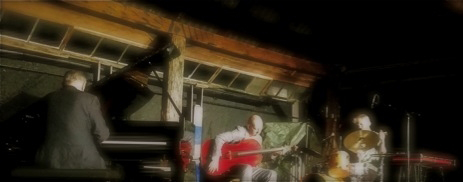
Den musikalischen Höhepunkt der 20 Konzerte lieferte das Trio Georg Gräwe (Piano), Ernst Reijseger (Cello) und Gerry Hemingway (Drums), zumal diese äußerst dichte Textur im hoch inspirierten Interplay ihresgleichen suchte. So individuell jeder Einzelne, so homogen das Ganze. Ein Kuss auf die Ohren.
Otmar Klammer Kleine Zeitung, 21.07.2014
The longstanding working trio of Georg Graewe (piano), Ernst Reijseger (cello) and Gerry Hemingway (drums) followed, and the level of extreme virtuosity that these three musicians displayed was nothing short of breathtaking. In fact, they stole some tears from my eyes during this set, I just couldn't believe how beautiful and assured and yet also how relaxed and human their music was.
Even though I've seen him play at least two dozen times before, Graewe's ultrasoft touch on the piano keys utterly enthralled me. They were pillowtime caresses, so erotic, even when abrupt changes of tone or velocity were involved. The smallest wrinkles of expression or tonality set off developments in the trio's music, not reactions. A subtle change then pounce pounce pounce wade quiver shave shine. Phenomenal listening and decision-making, reminding me that the highest caliber musicians in the world play this kind of music, and they play it here.
I could really see these musicians testing themselves in front of us, confronting their medium and themselves and each other in real time. Nothing else provides the opportunity to look so directly into the face of creation as this music, and this trio responded with the most fruitful possible alacrity, even while sometimes evoking the shadow of melancholy that haunts even the most celebratory of moments.
Shimmering upper-register glissando from Graewe poised along a hairclip-and-octopus-finger sequence of both top and bottom string-striking from Reijseger, Hemingway blowing into a glass tube for the bass that only breath provides. And that's what provoked some light tears from me, feeling so lucky to hear such music and to have found such an incredible home to hear it in.
They didn't need to play an encore, but they did, and it was wonderfully gritty, wafting in jugular sentiments. Death is so foretold it's ancient and welcome because of that. From Classicalite Blog - Photo and text by Andrew Choate
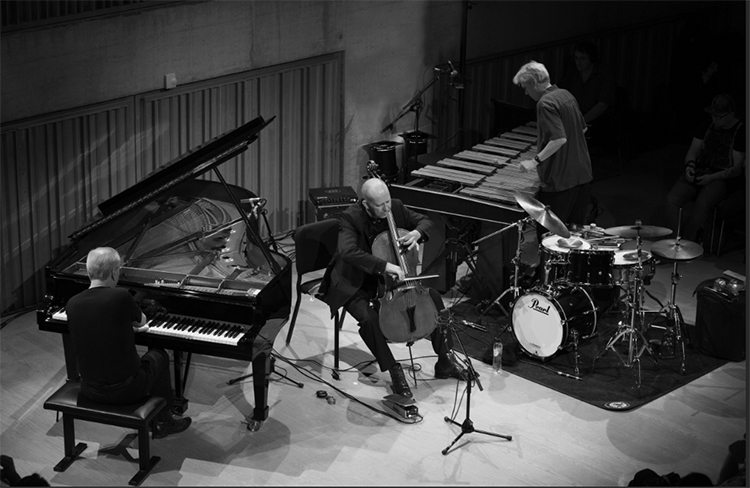
Graewe Reijseger Hemingway Concertgebouw Brugge, Kammermuziekzaal, October 3, 2014 - Photo Credit: Geert Vandepoele
GRH Trio in Essen, Germany October 12, 2014
GRH Trio in Nickelsdorf in 2014 (Pt 2 of 2)
GRH Trio in Nickelsdorf in 1995 (Pt 1 of 3)
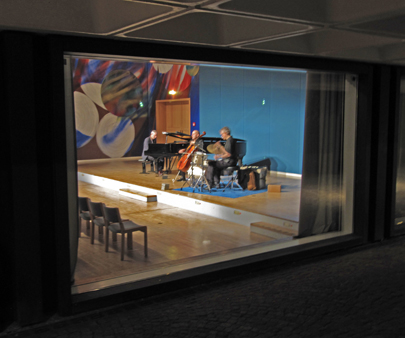
GRH soundcheck at the Museum in Bochum November 14, 2009
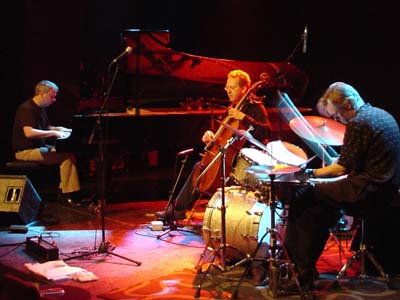
Vienna - Porgy & Bess 2009 - Photo Credit: Helmut Rizy (Wien)
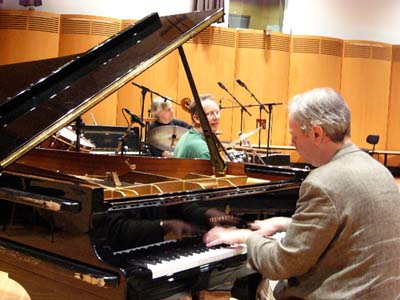
from the studio session for Winter & Winter in Munich (January 2006)
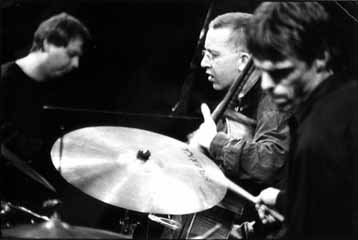
from the Bim Huis in the 90's - Photo Credit: Gert de Ruyter
GRAEWE REIJSEGER HEMINGWAY - Complete Discography
SONIC FICTION (1989) Hat Art (CD 6028) (streamed on YouTube)
ZWEI NACHTE IN BERLIN (1990) Sound Aspects (CD 049)
THE VIEW FROM POINTS WEST (1991) Music & Arts (CD 820) (streamed on YouTube)
FLEX 27 (1993) Random Acoustics CD 007
SATURN CYCLE (1994) Music & Arts (CD 958) (streamed on YouTube)
LA BONNE VITESSE (1994) Random Acoustics (CD 014) (bootleg recording only available from this website here)
COUNTERFACTUALS (1999) NuScope (CD1010)
CONTINUUM (2006) Winter & Winter (910 118-2) (streamed on YouTube)
CLEPTON (2006) THE GRH Trio with Earl Howard - New World Records 80670-2 ("Clepton" posted on You Tube)
CONCERTGEBOUW BRUGGE 2014 (2019) - Foundation Sluchaj (FSR 15 - 2019)
KAMMERN I-V (2019) [complete live recording from Schloss Elmau performance 2009] - Auricle Records (AUR -18)
REVIEWS of selected recordings:
GRAEWE REIJSEGER HEMINGWAY: Continuum (Winter & Winter) 2006
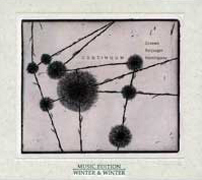 Despite several lengthy gaps between concerts and recordings in its 17-year run, the trio of pianist Georg Graewe, cellist Ernst Reijseger and percussionist Gerry Hemingway has articulated one of the more pellucid approaches to improvised chamber music. They are fastidious in giving material breathing space, and leaving some spaces blank. Even at their most robust, the trio retains a cool sense of direction. Yet, just as one thinks they tilt irrevocably towards contemporary classical music, the trio will, one way or another, reveal their rebellious roots in post-Coleman jazz and first-generation European improvised music.
Despite several lengthy gaps between concerts and recordings in its 17-year run, the trio of pianist Georg Graewe, cellist Ernst Reijseger and percussionist Gerry Hemingway has articulated one of the more pellucid approaches to improvised chamber music. They are fastidious in giving material breathing space, and leaving some spaces blank. Even at their most robust, the trio retains a cool sense of direction. Yet, just as one thinks they tilt irrevocably towards contemporary classical music, the trio will, one way or another, reveal their rebellious roots in post-Coleman jazz and first-generation European improvised music.
Recorded in a Munich hall with an impeccable piano, Continuum is a frequently stunning exposition of the trio’s resourcefulness and probity. A series of ten improvisations recorded in 2005, the album runs the gamut from silence-spattered accumulations of small details to rapid-fire exchanges with an earthy, forward rhythmic movement. However, there is a pensive quality to much of the music, established largely through the exquisite decay of Graewe’s single note lines and punctuating chords. It is a quality that Reijseger and Hemingway respond to with unfailingly sensitivity, be it with textures or well-placed counter lines (Hemingway plays “marimbaphone” and celesta). The approach is initially insidious, becoming gripping by the end of the album. Graewe, Reijseger and Hemingway’s ability to create an emotional connection in this manner distinguishes their work. - Point of Departure - Bill Shoemaker (2006)
This trio of pianist Georg Graewe, cellist Ernst Reijseger and percussionist Gerry Hemingway was an active aggregate in the early '90s. They slowed down towards the end of the decade and, prior to this album, had not released anything since 1999. Graewe's pianism is as protean as it is beautiful, and he does much to make this seminal trio's return the undeniable success that it is. He doesn't so much helm or control the group as he allows his multifaceted approach to the piano to embody its aesthetic.
But then, action and reaction are two sides of the same coin. In the second part of this suite, to cite only one example of Graewe's reactive and proactive tendencies, he augments and subverts a rhythmic pattern established by Hemingway and Reijseger, with the simple tactic of adding a slower layer. Registrally close, if not in immediate proximity, to Hemingway's celesta and Reijseger's plucked cello, Graewe begins with one note, then brings in another, allowing the texture to bloom and slowly expand. It is a truly magical moment.
It is counterproductive to single out any one member of this trio as some kind of leader. As much now as ever, the group thrives on unity in diversity, on each member's willingness to do what is outlined above. Hemingway's playing is at its most subtly inventive, a huge contrast to, say, his work with Braxton, but no less inventive. Reijseger lives in two worlds, maintaining an open-door policy between tonality and cluster, both making memorable appearances throughout this riveting set.
It is extremely gratifying to hear these three masters of spontaneous composition (not to mention more conventional forms of composition!) in documented communication again after too long a pause. Winter & Winter says that three hours of music were recorded. Not to appear greedy, but might another disc be hidden in there somewhere? AllAboutJazz Marc Medwin (December 16, 2006)
GRAEWE REIJSEGER HEMINGWAY: Counterfactuals (NuScope Recordings)
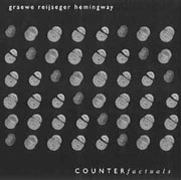 This is the seventh provocative and engaging release
for this striking trio of international improvising masters for
the consistently challenging Nuscope label. It was recorded live
in Ann Arbor, Michigan in November of 1999 - the tenth anniversary of this
excellent trio. Georg Graewe plays piano, Ernst Reijseger is/was
the amazing cellist for the ICP Orchestra and the Clusone Trio
and Gerry Hemingway is perhaps the finest of all local improvising
drummers and percussionists. Like all Nuscope releases, this
one has well defined sound.
This is the seventh provocative and engaging release
for this striking trio of international improvising masters for
the consistently challenging Nuscope label. It was recorded live
in Ann Arbor, Michigan in November of 1999 - the tenth anniversary of this
excellent trio. Georg Graewe plays piano, Ernst Reijseger is/was
the amazing cellist for the ICP Orchestra and the Clusone Trio
and Gerry Hemingway is perhaps the finest of all local improvising
drummers and percussionists. Like all Nuscope releases, this
one has well defined sound.
"Menuet" is the opening piece and it begins tentatively at first, but quickly builds as the abstractions get thicker and more certain. Gerry plays with his hands on the drums in a most natural way, as the cello and piano playfully expand their palettes - slowly things get more heated and ascend as the reactions and ideas are exchanged more quickly. "kindling" also starts out delicately, but soon the trio begins to buzz in sections - darker and more suspenseful eruptions take place as the fog becomes more dense and difficult to absorb readily. There is a completely natural flow of events, an undercurrent which connects the trio to another and to all who listen closely.
By the third track - "une geste plus rapide" - the waters get even more dense and difficult and engaging - the piano and drums start to fly quickly together, spinning a furious web as Ernst also plucks more intensely - eventually exploding together in a frenzy of dense activity and then winding down to a more haunting and minimal section. On "zer-streuung" the trio flies with a smoother, more swinging jazz flow - taking off into the skies with inspired energy. Gerry takes a marvelous, inventive percussion solo with more hands-on-drums wackiness while Ernst begins bowing weird sonic spirits on his cello. These cats consistently match each other's ever-inventive spirit - never letting go of the cosmic flow - each section moves in waves from quiet and trance-like to quick and explosive. This is a challenging and moving set which is captured perfectly.
Downtown Music Gallery web site review from Bruce Gallanter
GRAEWE REIJSEGER HEMINGWAY: Zwei Nachte in Berlin (Sound Aspects 049)
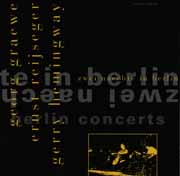 Anyone working under the misconception that all free piano
must sound something like Cecil Taylor, lend an ear to German
pianist Georg Graewe (pronounced Gray-vuh). Forceful and deliberate,
he recalls Lennie Tristano's linear fluidity and Bill Evans' harmonic
delicacy, filtered through the 12-toned, tone-colored lens of
Anton Webern. The trio with Hemingway and Reijseger has been around
since 1989, and these two live discs offer a glimpse of the free-improvising
threesome as it develops its singular identity. Zwei Nachte in
Berlin,recorded over two nights at the Total Music Meeting in
'90, is the more animated and directly interactive of the two.
It's also a sharper recording, with Hemingway's bright metals
and Reijseger's cello mixed to the foreground. Listen, about six
minutes into the half-hour-long opener Muss Musik Nun Erklingen?
as the trio simultaneously grazes a static patch, Graewe riding
a damped note, Reijseger performing some arco alchemy, and Hemingway
summoning shimmering harmonics by rubbing his cymbals. Reijseger
alone is astounding, practically turning his instrument inside-out,
using it as a percussion box, guitar, miniature bass, and sometimes
sounding as cellistic as Pablo Casals. As the track pulls to a
close, Hemingway's swinging hard, Reijseger's speed walking, and
Graewe's doing his best Lennie-Bird. John Corbett March 1995 DOWN BEAT
Anyone working under the misconception that all free piano
must sound something like Cecil Taylor, lend an ear to German
pianist Georg Graewe (pronounced Gray-vuh). Forceful and deliberate,
he recalls Lennie Tristano's linear fluidity and Bill Evans' harmonic
delicacy, filtered through the 12-toned, tone-colored lens of
Anton Webern. The trio with Hemingway and Reijseger has been around
since 1989, and these two live discs offer a glimpse of the free-improvising
threesome as it develops its singular identity. Zwei Nachte in
Berlin,recorded over two nights at the Total Music Meeting in
'90, is the more animated and directly interactive of the two.
It's also a sharper recording, with Hemingway's bright metals
and Reijseger's cello mixed to the foreground. Listen, about six
minutes into the half-hour-long opener Muss Musik Nun Erklingen?
as the trio simultaneously grazes a static patch, Graewe riding
a damped note, Reijseger performing some arco alchemy, and Hemingway
summoning shimmering harmonics by rubbing his cymbals. Reijseger
alone is astounding, practically turning his instrument inside-out,
using it as a percussion box, guitar, miniature bass, and sometimes
sounding as cellistic as Pablo Casals. As the track pulls to a
close, Hemingway's swinging hard, Reijseger's speed walking, and
Graewe's doing his best Lennie-Bird. John Corbett March 1995 DOWN BEAT
GRAEWE REIJSEGER HEMINGWAY: The View from Points West (Music & Arts 820)
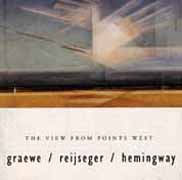 The
View From Points West documents a transcendent evening seven months
later at the du Maurier Jazz Fest in Vancouver. Working in a limited
dynamic mid-range - they never raise too raucous a ruckus and
rarely dip down into hushville - the trio manages to generate
tension, movement, drama, and points of devastating intensity.
Like Zwei Nachte, this disc begins with a long, constantly morphing
piece Lighthouse followed by a series of shorter excursions.On
Monk-ey-ing Graewe drops Thelonious-licks into a scattered field
of sound. The ever-welcome ghost of Tristano reappears on the
disc's most openly playful track Strange Picnic (fusionheads,
check Reijseger's hot chops!), while on Dig, Drill, Dump, Fill
the unit turns pointillistic, Hemingway mixing wood blocks, vibes,
and kit for maximum color. John Corbett
March 1995 DOWN BEAT
The
View From Points West documents a transcendent evening seven months
later at the du Maurier Jazz Fest in Vancouver. Working in a limited
dynamic mid-range - they never raise too raucous a ruckus and
rarely dip down into hushville - the trio manages to generate
tension, movement, drama, and points of devastating intensity.
Like Zwei Nachte, this disc begins with a long, constantly morphing
piece Lighthouse followed by a series of shorter excursions.On
Monk-ey-ing Graewe drops Thelonious-licks into a scattered field
of sound. The ever-welcome ghost of Tristano reappears on the
disc's most openly playful track Strange Picnic (fusionheads,
check Reijseger's hot chops!), while on Dig, Drill, Dump, Fill
the unit turns pointillistic, Hemingway mixing wood blocks, vibes,
and kit for maximum color. John Corbett
March 1995 DOWN BEAT
GRAEWE REIJSEGER HEMINGWAY, FLEX 27, RA 007
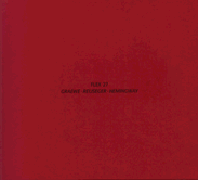 Take Gerry Hemingway, add his long - time companion, Dutch
cellist Ernst Reijseger, and German pianist Georg Graewe, mix
this concoction together and stir for a few years, then watch
the fireworks fly! No doubt, what this drum-cello-piano trio achieves
on their fourth album, Flex 27 (following on the heels of the
hot as hell marvel of Zwei Naechte in Berlin), is pure magic.
Sure, they're exclusively involved in pure, instantaneous improvisation,
which is not always the easiest stuff for the more conservative
jazz crowd. Georg's piano delivery (light and precise one minute,
stop-and-go and fiercely moving the next) blends in so well with
Ernst's cello plucking and Gerry's persisitent, understated (hushed!)
but swinging drum work, it's too difficult to list all the superlatives
that come to mind. Mind-boggling music.Tom
Sekowski, EXCLAIM, March 1996
Take Gerry Hemingway, add his long - time companion, Dutch
cellist Ernst Reijseger, and German pianist Georg Graewe, mix
this concoction together and stir for a few years, then watch
the fireworks fly! No doubt, what this drum-cello-piano trio achieves
on their fourth album, Flex 27 (following on the heels of the
hot as hell marvel of Zwei Naechte in Berlin), is pure magic.
Sure, they're exclusively involved in pure, instantaneous improvisation,
which is not always the easiest stuff for the more conservative
jazz crowd. Georg's piano delivery (light and precise one minute,
stop-and-go and fiercely moving the next) blends in so well with
Ernst's cello plucking and Gerry's persisitent, understated (hushed!)
but swinging drum work, it's too difficult to list all the superlatives
that come to mind. Mind-boggling music.Tom
Sekowski, EXCLAIM, March 1996
------------------------------------
Pianist Georg Graewe has been working with Reijseger and Hemingway for some years. Flex 27 is a spare, judicious album of miniatures. There's no expressive Improv overload in sight - restraint dominates the game, and the trio play with immense mutual confidence. They have a disciplined way of building a succession of distinctive episodes within the slightly longer pieces, which amounts to exemplary group work. It's highly mobile music, stubbornly resistant to definition or stasis. Graewe presents his ideas in an fleeting, elusive way, Reijseger tends to fuller elaboration, and Hemingway makes an extraordinarily sensitive arbiter of what goes or doesn't go. It is perhaps his uniquely open approach that gives the trio its unusual flexibility. Will Montgomery The Wire - July 1995
GRAEWE REIJSEGER HEMINGWAY: SATURN CYCLE, Music & Arts CD 958
 The new release from this amazing trio was
recorded live in Koln, Germany in 1994. Improvisational for the
most part, structural motifs guide the listener through an dazzling
array of mind bending virtuosity. While the improvisation is astounding,
one gets the feeling that these pieces were composed and rehearsed;
the uncanny ability of these three to anticipate complex chord
changes and tempo shifts are unique attributes.
The new release from this amazing trio was
recorded live in Koln, Germany in 1994. Improvisational for the
most part, structural motifs guide the listener through an dazzling
array of mind bending virtuosity. While the improvisation is astounding,
one gets the feeling that these pieces were composed and rehearsed;
the uncanny ability of these three to anticipate complex chord
changes and tempo shifts are unique attributes.
The first two cuts "La Bonne Vitesse (approximation 1&2)" commence with the whirling dervish piano voicings of Graewe. Dutch cellist Ernst Reijseger provides the bass, rhythm and arco cello solos. Hemingway is a "musicians" drummer. Known for being a fine and inventive percussionist, Hemingway has over the years also led a brilliant ensemble which included Reijseger and Micheal Moore (thus, two thirds of another great band called Clusone). Hemingway's subtle percussives and Reijseger's walking and talking cello run complement to Graewe's introspective and probing ideas.
Things heat up again. On ensuing cuts like "Future Reference" and "Saturn Cycle," tempos change on a dime, the band swings hard and everyone is having a blast. The pace is remarkable. Twists and turns, sudden stops adds up to obvious group awareness. The ability of this trio's internal cognizance is awe inspiring.
Fear not, this not a blatant chops fest. The compositions are collective works. Thoughtful, penetrating and unpretentious, this music takes you on a journey. A journey of ideas, interplay and fascination.
Graewe is a singular talent with a sparkling voice that deserves to be heard. Saturn Cycle contains the various elements of free-jazz, chamber music, and hard swing, and is an appropriate title for this recording, as the musicians all put themselves to the limit. Reviewed by: Glenn Astarita, 1998
GRAWE REIJSEGER HEMINGWAY (preview for performance in Chicago & review of Saturn Cycle
This Monday the trio--Grawe's most consistent and artistically successful group in the early 90s--makes its long-awaited Chicago debut as part of its tenth-anniversary tour. Though this decidedly experimental ensemble often functions as a standard piano trio, with Reijseger playing bass lines, the musicians rarely rely on familiar, swinging structures; instead they seamlessly fuse the European classical tradition, free improvisation, and the early trio work of Bill Evans. At its best the group makes daring, spontaneous leaps from elegiac tiptoeing to cubist seesawing to cacophonous rumbling, animated by a dazzling collective intuition. And all three members are gifted with incalculable range: Grawe switches easily from fragile romanticism to galvanic post-Cecil Taylor bass clusters; Reijseger moves from tactile arco screeches to finger-snapping walking lines as casually as he might shift his weight from foot to foot; and Hemingway is just as comfortable dropping percussive bombs as he is bowing a delicate, infinitely variable tone from one of his cymbals. I haven't heard their latest release, La Bonne Vitesse (Random Acoustics), recorded at a concert in 1994, but Saturn Cycle (Music & Arts), recorded the same year, displays the arresting give-and-take they'd achieved at the time. There is no single leader; instead every musician regularly takes the fore, influencing what comes next by isolating and accenting an element from the current episode. Chasing epiphanies is standard procedure in free improv, but it's a rare group that can combine such a spontaneous approach with a gorgeous, dramatic compositional flow. review from: November 04, 1999, Chicago Reader Peter Margasak
GRAEWE REIJSEGER HEMINGWAY: SONIC FICTION, HatArt CD 6043 (1990) // ReRelease HatOLOGY 638 (2007)
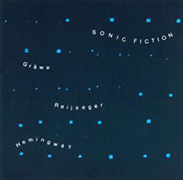
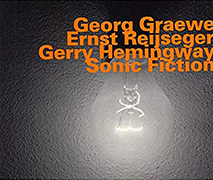 This long-standing and prolific international trio's debut finally gets the reissue treatment. Still quite active and stylistically amorphous, the group's first statement remains a bold one, establishing a collective aesthetic that defied boundary and categorization while making its place in history clear. The second part of "Alien Corn" is as fine a point of departure as any—drummer Gerry Hemingway ushering the track in with brushwork that stands quietly on pins and needles. His explosion into cymbals invokes a fairly standard trio interaction and yet the music thrives on quirky understatement, Ernst Reijseger's cello jumping registers without restraint but all at a medium dynamic.
This long-standing and prolific international trio's debut finally gets the reissue treatment. Still quite active and stylistically amorphous, the group's first statement remains a bold one, establishing a collective aesthetic that defied boundary and categorization while making its place in history clear. The second part of "Alien Corn" is as fine a point of departure as any—drummer Gerry Hemingway ushering the track in with brushwork that stands quietly on pins and needles. His explosion into cymbals invokes a fairly standard trio interaction and yet the music thrives on quirky understatement, Ernst Reijseger's cello jumping registers without restraint but all at a medium dynamic.
Much of the disc thrives on space, on the glimmers of interstitial luminosity that would typify the trio's later output. Things do heat up a bit with "Sleeperwaltzer," which is just that, at least from Hemingway's point of view. It begins slowly enough, but a pause cracks the listener's perception of time in two just before the mayhem begins. Pianist George Graewe's proportional rhythms and constant tempo shifts keep everyone on tiptoes and Reijseger glides, swoops and sharp-shoots his way through the polyrhythms with Webern-ian ease and dexterity.
If "Fibulation" sports some of the European maximalism associated with early Spontaneous Music Ensemble, there's enough of the trio's character, in hindsight, to set the group apart from whatever references it might evoke. The playing is superb, the sound equally brilliant, but there might not be enough improvement in this reissue to justify a repurchase. That said, there is no better place to start exploring the group's output than at the beginning and those who take the plunge have worlds of discovery ahead. AllAboutJazz Marc Medwin (3/2008)
This trio, all of whose members had played together in various settings before, had something going for them from the very beginning: They all distrust labels, and they all believe in spontaneous creation. Not every improvising musician can make this claim; many are tied to one tradition or another for their inspiration, whether it's classical, jazz, rock, whatever. Each of the individuals here -- Gräwe on piano, Reijseger on cello, and Hemingway on all manner of percussion -- is a bandleader in his own right. Given this, each musician is very conscious of his partners in this recording. All members are, from the first part of the three-part suite "Alien Corn," fully invested in the process of coaxing not only the most suitable and exciting music from their own chosen instruments, but from the other two as well. For instance, in "Alien Corn III" Reijseger goes to the wall with Hemingway, drawing out more outrageous ideas and understated rhythms. In response, rather than play louder or faster, Hemingway keeps the volume dynamic the same and uses as many techniques on his instruments as he can. All the while Gräwe hangs a backdrop for the duo to create a context from. It sounds and feels like play, like fun, and it probably is. But it is also a razor-sharp manner of listening to, and playing to, both individual and group dynamics. Reijseger makes great use of his exceptional ability to play pizzicato. More often than not, particularly in the smaller passages "Fangled Talk" and "Aspects of Somnambulism," he comes off as a bass player who studied Mingus' technical development as an improviser; he is always on top of the tempo yet never winding it tighter than it needs to be. Sonic Fiction is a kind of music made in the air, with three instrumentalists speaking to some point that all of them can see, but never touch. It's up to language -- and in this case, musical language comprised of the three sounds making a single new one -- to do that. And that it lasts only for the course of the hour of this recording is a fiction; it extends the reach of each of the players and the context of sonic possibility for the listener. AllMusicGuide Thom Jurek
Georg Graewe
Ernst Reijeseger
Gerry Hemingway